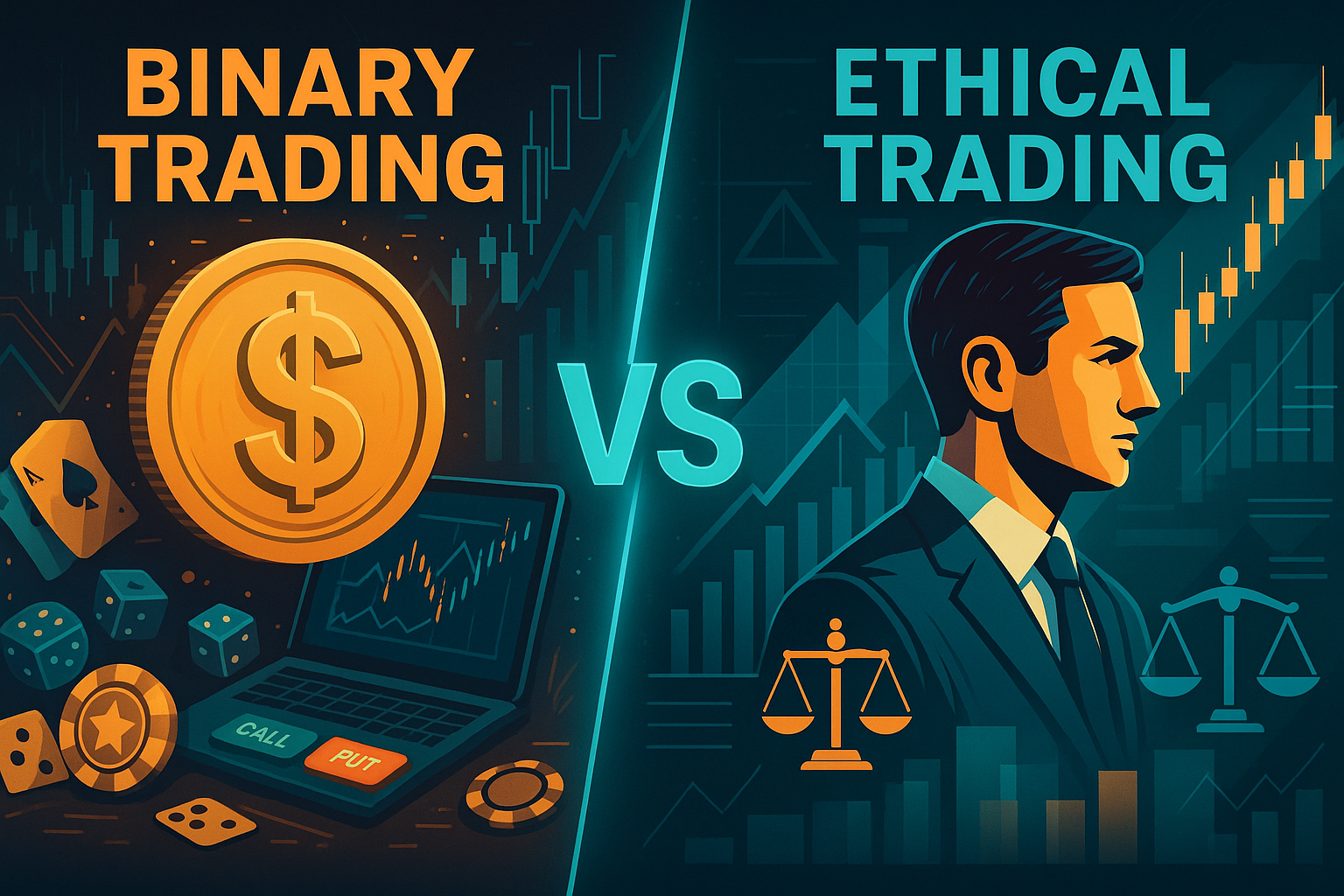Binary vs Ethical Trading: Why STRATEGIC Rejects. In today’s financial markets, new opportunities constantly appear, often marketed with promises of speed, simplicity, and quick profits. For beginners, one of the most appealing shortcuts is binary trading. On the surface, the process looks incredibly straightforward: you predict if the price of an asset will rise or fall within a short time frame, place your trade, and then either win a fixed payout or lose your stake. No need for advanced chart reading, complex strategies, or years of market study — just two choices, up or down. This is exactly why it attracts so many newcomers looking for an easy entry point into trading.
Yet, this apparent simplicity hides a far more dangerous truth. Binary trading is not designed to build long-term wealth. Instead, its structure mirrors gambling, where traders rely more on luck and emotions than on skill or strategy. Trades are often settled in minutes or even seconds, leaving no room for thoughtful risk management or strategic planning. Worse still, when you factor in broker fees, spreads, and the fact that many platforms are unregulated, the actual odds are stacked heavily against the trader. Like a casino, the system is built so that over time, the “house” almost always wins.
Binary Trading vs Ethical Trading: Why STRATEGIC Rejects the Shortcut Mindset
This is where the difference between binary trading vs ethical trading becomes crystal clear. Ethical trading is about structure, patience, and discipline. It is based on understanding market trends, applying risk management, and making informed decisions supported by data. Binary trading, on the other hand, thrives on impulsiveness and short-term excitement. Its fast results create an addictive cycle: small early wins give traders false confidence, while inevitable losses push them to chase risks even further. Instead of developing knowledge and consistency, traders are trapped in a loop of emotional decisions that almost always lead to failure.
At STRATEGIC, we reject this shortcut mindset entirely. Our philosophy is built on three pillars: discipline-based trading, ethical investing, and AI-powered system development. Every decision we make aligns with these values. We believe trading should never exploit inexperience or addiction; it should empower traders to grow through structure and discipline. By combining human learning with AI-powered tools such as ZEHNOX, we help traders build systems that are repeatable, reliable, and sustainable. For us, binary trading is not just risky — it fundamentally goes against the ethical, long-term approach that we believe every trader deserves.
Binary Trading vs Ethical Trading: The Appeal of Simplicity vs the Reality of Risk
Binary trading is marketed as the “easiest way to trade.” It attracts beginners with promises of:
- Simplicity: Only two choices — price goes up or down.
- Speed: Trades complete in minutes or seconds.
- Fixed Payouts: Know your potential win or loss in advance.
- Accessibility: Trade with small amounts.
At first, this looks appealing. Human psychology loves certainty, and the idea of fast wins feels empowering. But when we compare binary trading vs ethical trading, the reality becomes clear. Binary options hide risks that make long-term success almost impossible.
Like flipping a coin, binary trades appear to offer 50/50 odds. But once you include broker spreads, fees, and platform manipulation, the trader’s real odds fall below 50%. Over time, the “house” wins — just like in gambling.
Why Binary Resembles Gambling
Although binary options are marketed as financial tools, they have far more in common with casino games than with disciplined trading. Here’s why:
1. No Real Asset Ownership
In ethical trading, you invest in or hedge real assets — like stocks, commodities, or currencies. In binary trading, you own nothing. You’re simply betting on short-term direction.
2. Fixed Outcomes, No Flexibility
Ethical traders adapt. They manage risk, adjust positions, and exit trades strategically. Binary traders can’t — once placed, the trade ends in a win or loss, with no control in between.
3. Addiction Through Short Cycles
Binary trading’s fast results trigger dopamine responses like slot machines. This cycle builds addiction rather than discipline.
4. Broker Conflict of Interest
Most binary brokers profit when traders lose, making the setup inherently unfair. Ethical brokers earn commissions without betting against their clients.
This is the core difference when comparing binary trading vs ethical trading: one exploits human psychology, while the other builds long-term discipline and resilience.
STRATEGIC’s Ethical Stand: Why We Reject Shortcuts
At STRATEGIC, we believe trading should never resemble a casino. Instead, our philosophy is built on three pillars:
- Discipline-Based Trading – Every trade follows structured rules.
- Ethical Investing – We reject methods designed to exploit ignorance.
- AI-Powered System Support – Through STRATEGIC x ZEHNOX, we design systems that strengthen discipline.
Binary trading violates all three principles. It rewards impulsiveness, thrives on inexperience, and offers no real system for growth.
By contrast, ethical trading with STRATEGIC develops traders who:
- Understand market structure (BOS, CHOCH, order blocks).
- Apply strict risk management.
- Journal trades for continuous improvement.
- Build resilience and patience for long-term success.
Case Study: The Binary Trap vs Ethical Growth
Meet Ali, a beginner trader. He starts binary trading with $500. At first, he doubles his account with quick wins. Encouraged, he increases trade size. Then, a losing streak erases all his profits. Chasing losses, he continues until his account is empty within weeks.
Ali’s story is not unique — it’s the reality for most binary traders. Studies show 80–90% of binary traders lose money long-term. Why? Because binary options exploit common biases:
- Overconfidence after early success.
- Revenge trading after losses.
- Addiction to short-term rewards.
Now, compare this with ethical trading. An ethical trader applies risk rules, journals trades, reviews mistakes, and adapts systems. Instead of fast wins and faster losses, the focus is long-term consistency.
Binary Trading vs Ethical Trading: The System Solution with AI
So what’s the alternative? At STRATEGIC, we train traders in structured, system-based trading, supported by AI technology.
Our approach includes:
- Clear Entry Models: Based on market structure, not guesses.
- Risk Management Rules: Fixed risk per trade, no over-leverage.
- Journaling & Feedback: Learning from each trade.
- ZEHNOX AI Tools: Providing data-driven insights and reducing emotional decisions.
Unlike binary trading, our method builds skills, consistency, and growth. This is the true power of comparing binary trading vs ethical trading.
Ethical AI: Support, Not Shortcuts
AI is often misused in trading. Many platforms sell “auto-bots” promising easy binary wins. These are scams designed to exploit traders’ hopes.
STRATEGIC uses AI ethically to:
- Backtest trading systems.
- Identify trading patterns.
- Support journaling.
- Reduce emotional errors.
This is not about shortcuts. It’s about building better habits and stronger systems.
Why STRATEGIC Rejects Binary Trading
To summarize the battle of binary trading vs ethical trading:
- Binary trading is gambling, not investing.
- It thrives on addiction and psychological traps.
- It puts brokers against traders.
- It violates STRATEGIC’s principles of discipline and ethics.
Our goal is different. We help traders build resilience, discipline, and long-term systems for success. We don’t build gamblers — we build ethical, system-based traders.
Frequently Asked Question
Is binary trading a good way to make quick money?
Answer: Binary trading may look like a shortcut to fast profits, but it is actually designed more like gambling. The odds are tilted against traders because of broker fees, short timeframes, and a lack of flexibility. While you might win a few trades in the beginning, most traders lose money in the long run. The better path is ethical, structured trading, where you build long-term consistency instead of chasing quick wins.
How is ethical trading different from binary trading?
Answer: The key difference in binary trading vs ethical trading lies in structure and sustainability. Binary trading is impulsive, outcome-fixed, and addictive, while ethical trading focuses on discipline, strategy, and risk management. Ethical trading teaches you to understand market structure, review your trades, and use tools like AI to improve decisions. It’s about steady growth rather than short-term luck.
Why do most people fail at binary trading?
Answer: Most people fail because binary trading feeds on human psychology. Early small wins give traders overconfidence, while losses push them into revenge trading. The short timeframes and “all or nothing” outcomes are addictive, making it easy to lose control. Without proper risk management and system-based strategies, losses quickly pile up.
Can AI or trading bots help with binary trading?
Answer: Many platforms promote “auto-bots” for binary trading, but these are often scams. They promise guaranteed results but are designed to take advantage of beginners who want shortcuts. At STRATEGIC, we use AI ethically through tools like ZEHNOX — not to gamble, but to support traders with data-driven insights, backtesting, and structured journaling. AI should guide discipline, not replace it.
What’s the safer alternative to binary trading?
Answer: The safer and smarter alternative is ethical trading with structured systems. This means following a strategy that includes clear entry models, fixed risk per trade, journaling, and continuous feedback. At STRATEGIC, we combine this approach with AI support, giving traders the tools they need to grow consistently instead of relying on luck.
Conclusion: The STRATEGIC Way Forward
Binary trading may look simple, but it is dangerous. Its structure creates impulsiveness, not discipline. It builds addiction, not skill. It sets traders up to lose, not to grow.
At STRATEGIC, we choose the harder but more rewarding path. We reject shortcuts like binary options. We believe in structured, ethical, and AI-supported growth.
If you’re serious about becoming a trader, stop gambling with binary shortcuts. Start building systems, structure, and discipline. That’s the path to lasting success.
want to read more about trading click here
Big Shoutout to the guys who made this blog happen UDM.




